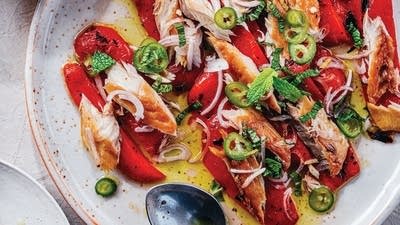
Francis Lam recently took over the host position on The Splendid Table following in the footsteps of more than 20 years of Lynne Rossetto Kasper. On his second full episode as the official host, Francis thought it would be nice to get some advice from someone in a similar situation. Chris Thile is that guy. Chris is a genius of a musician and songwriter. But more to the point he’s the new host of A Prairie Home Companion, having taken over last fall as host of the show after four decades of Garrison Keillor at the helm.
Francis Lam: Chris, thanks so much for joining us.
Chris Thile: Thank you very much for having me and congratulations.
FL: Thank you and congratulations to you.
CT: Thank you.
 Chris Thile on stage as host of A Prairie Home Companion
Chris Thile on stage as host of A Prairie Home Companion
FL (laughing): This kind of segment could just be six minutes of us saying congratulations to each other.
I feel like I have an easier job than you because Lynne hosted The Splendid Table for only twenty-something years, not forty-something. Many people – including me – adore her. I don’t want to screw this up for you or for me or for her or for anyone else. Do you have any advice for me? What’s it like taking over a show from someone who’s so beloved?
CT: I did this exact same thing to Trevor Noah who was on A Prairie Home Companion and who, of course, succeeded Jon Stewart as host of The Daily Show. I think what we should call these little segments, “How to Succeed at Succeeding.”
Both of us are assuming the helm of these programs that have provided people with so much comfort for so long. I did an interview with Garrison where we were sitting on a bench that overlooked the reservoir in Central Park and he started drawing a parallel between the show and the reservoir, in that he lives very close to the reservoir and goes for a walk every morning around it. A lot of people do that. And he started talking about how he felt like a lot of people use A Prairie Home Companion for that. And I have used The Splendid Table for that for many years.
To me, our real challenge here is how do we maintain Garrison’s reservoir, our respective versions of that. While, of course, trying to make the show our own because you trying to do this like Lynne did it will result in something that is necessarily second-best because Lynne’s Lynne. You’re Francis. Obviously, me trying to host A Prairie Home Companion like Garrison is the same situation. I could never be Garrison Keillor. And me trying to do my best Garrison Keillor impression is just not going to be satisfying.
I don’t know about any specific advice other than the listening process is very different. You don’t buy a ticket. Oftentimes what happens is you’re in the car and for me with a show like A Prairie Home Companion that I loved and was raised on, it’s like “Oh, oh, it’s A Prairie Home Companion time!” I’ll turn on the radio. That’s very different than saying “Oh, A Prairie Home Companion is in town. I’m going to buy a ticket and go check it out.”
I think that’s been something to get used to. In a way, the performance is actually more collaborative with your audience. You’re not performing for them so much as with them, you’re a part of their week. You’ve come to them, as opposed to them coming to you.
FL: This brings me to something you said before about this idea of comfort. It’s not just that people are used to Garrison or Lynne and their voices and their perspectives, but there’s something about our shows that I think provide a lot of listeners with a sense of consistency and comfort.
At the same time, I also have real respect for the power of food. Part of what that means to me is that talking about food isn’t always going to be “Hey, that’s delicious. How do you make that?” Certainly this show explores food in a lot of different ways and always has. But I also feel like food touches on every part of our lives and part of what that means is sometimes it tells a story that’s a little bit harder to hear. Even though that’s still really enriching it can be tougher or more complicated.
Food and music I think are similarly powerful in that they both can do so much to us emotionally. But hearing that lyric, “You should be super psyched” and thinking about the privilege I have to do what I love for a living, it really made me think about it. Do we have a responsibility to just give people an hour or two hours of fun?
CT: Like respite. Like an oasis or sanctuary or something.
FL: Even though in my mind, like I said, it’s food. It touches every aspect of our lives and so it’s the good, the bad, to complicated, the tense, all that stuff.
CT: Oh man, sometimes it’s inseparable, right? But also, the juxtaposition between the two muses that are going back and forth during that song, that’s intentionally trying to get this exact kind of conversation started -- of the value of escapism. There is beauty in escapism. Just taking a break so that you have the strength to, as Garrison might say, get up and do what needs to be done after the two hours we have or you guys have an hour. There’s also value in having that conversation in the midst of that respite.
FL: I think about that, what you are saying, and I recognize there is a real responsibility that I have to the listener. And obviously I’ve been a writer and I’ve done other things where the point of it is about communication. If you write the most beautiful story in the world to you, and you don’t write it in a way that other people are able to get into – if it doesn’t invite people into it – it’s fundamentally worthless. You can make something, but the thing only has meaning if there’s someone on the other side to make meaning of it.
CT: Oh, man, preach! That is it. Yes!
FL: Thank you so much for talking with me, Chris, and good luck to both of us to figuring this out.
CT: Let’s do it again and talk about food.
FL: We’ll talk about cacio e pepe next time, exclusively.
CT: Yes, I want tips.
Before you go...
Each week, The Splendid Table brings you stories that expand your world view, inspire you to try something new, and show how food connects us all. We rely on your generous support. For as little as $5 a month, you can have a lasting impact on The Splendid Table. And, when you donate, you’ll join a community of like-minded individuals who love good food, good conversation, and kitchen companionship. Show your love for The Splendid Table with a gift today.
Thank you for your support.
Donate today for as little as $5.00 a month. Your gift only takes a few minutes and has a lasting impact on The Splendid Table and you'll be welcomed into The Splendid Table Co-op.




